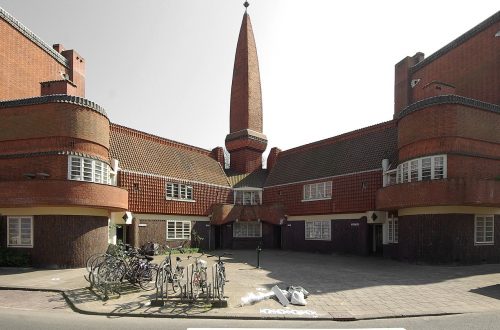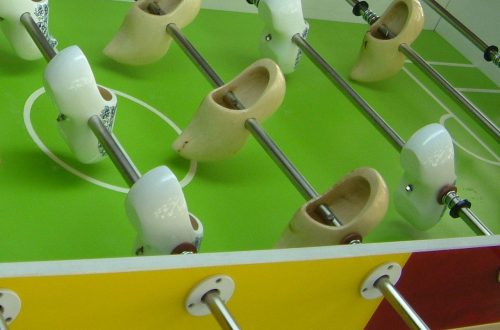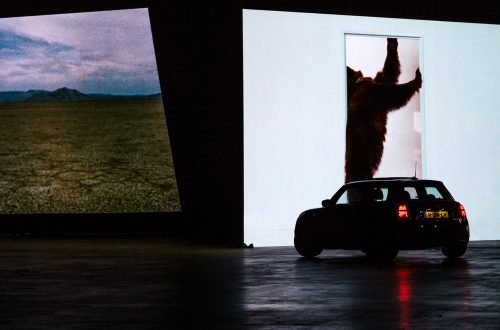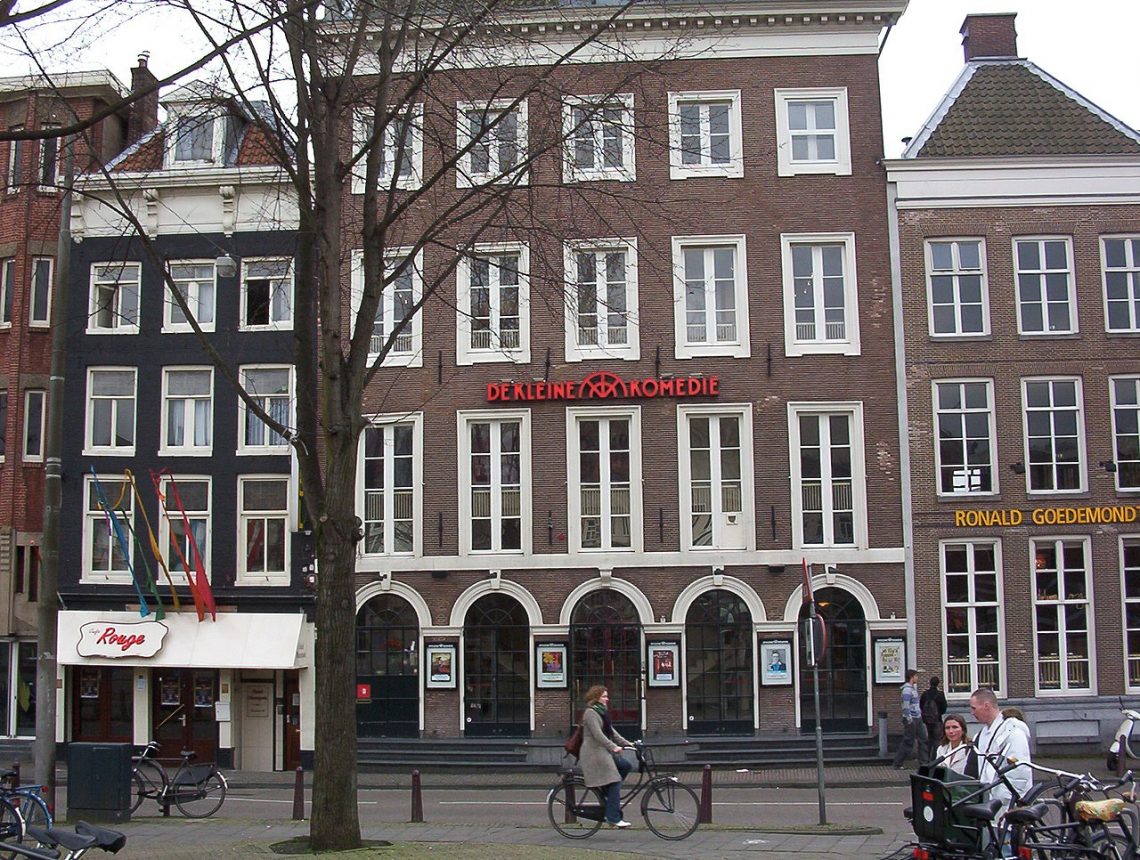
Unlock(down) the Advent Calendar (Amsterdam, the Netherlands)
The Kleine Komedie created the Adventskalender, every day in December, people could open up an advent ‘window’ at the theatre’s website and could watch regular artists of the theater perform online acts. These varied from cabaret, singing, cooking and storytelling. All artists decided to participate, many cabaret artist in the Netherlands were not eligible for the government support packages and thus were drastically impacted. Therefore the most important impact was economic as it provided the in-house artists with an income as every performance was paid for. And, with 1.7 million views worldwide, it also showed that there was a very enthusiastic audience.
Background
De Kleine Komedie was built in 1786 and is the oldest theater in Amsterdam and the second oldest in the Netherlands. The theater’s original name was Theater Français sur l’Erwtenmarkt. In 1855 the theater went bankrupt and from 1880 a lecture hall was set up here. In the 20th century the building was used for musical performances and debates. After the wars, the building was rebuilt into a theater and reopened in 1948 called De Kleine Komedie. The theater will be included in Amsterdam’s arts plans and will grow into ‘the cabaret temple of the Netherlands’. De Kleine Komedie has become increasingly well-known and the range in the theater has expanded. Today, the stage is mainly used by storytellers, through cabaret, musical events, literary programs and theater concerts (De Kleine Komedie n.d.).
De Kleine Komedie has a clear vision of the audience that the organization reaches and knows how to retain this audience well. With the carefully composed programming and selected performing artists as a starting point, the theater reaches a diversity of target groups. The stage has a very mixed audience; young and old, culturally diverse and audiences that are not regularly found in the theater.
The mission of the theatre is to program substantive performances by makers with a vision, story and the ability to move and provoke thought. The selection is based on qualitative, critical and therefore often vulnerable cabaret. De Kleine Komedie focuses on theater makers who create substantive programs and who belong to the top of this genre in the Netherlands in terms of quality, with a balance between emerging talents and established performing artists.
Another aim is to recognize and present young makers and to guide them. De Kleine Komedie feels a responsibility for the artistic development of the young talents, their self-development and their advancement to a larger audience (Amsterdam fonds voor de kunst n.d.).
Description
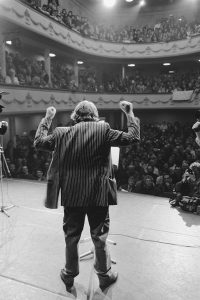 The programme for de Kleine Komedie was already made for 2020. Until March 12th everything went well, but from this date on everything in The Netherlands changed due to a lockdown. The theatre started brainstorming about what to do next. De Kleine Komedie wanted to create something fun for all people sitting at home during this dark time, especially around the holidays. The director of the theatre organized the concept of an Advent Calendar for the last month of the year. Every day of the week in the month of December a new regular artist of de Kleine Komedie would be in a video with different acts. Dutch artists such as comedians Jochem Myjer and Erik van Muiswinkel would entertain you with cabaret, or the rapper Typhoon introduced a new song to his fans. There was a mix of videos for everyone, young and old, but focusing mostly on lighthearted entertainment. Because people were missing to go out to the theatre, they filmed the Adventskalender not with your face towards the back of the stage, but also the other way around. This way viewers would look right into the seats and would really see what they had missed, that place right in de Kleine Komedie. The fact that the theatre could adapt so well was also due t the fact they had just invested in four new cameras because they were already starting out to explore live streaming before they were hit by the lock-down.
The programme for de Kleine Komedie was already made for 2020. Until March 12th everything went well, but from this date on everything in The Netherlands changed due to a lockdown. The theatre started brainstorming about what to do next. De Kleine Komedie wanted to create something fun for all people sitting at home during this dark time, especially around the holidays. The director of the theatre organized the concept of an Advent Calendar for the last month of the year. Every day of the week in the month of December a new regular artist of de Kleine Komedie would be in a video with different acts. Dutch artists such as comedians Jochem Myjer and Erik van Muiswinkel would entertain you with cabaret, or the rapper Typhoon introduced a new song to his fans. There was a mix of videos for everyone, young and old, but focusing mostly on lighthearted entertainment. Because people were missing to go out to the theatre, they filmed the Adventskalender not with your face towards the back of the stage, but also the other way around. This way viewers would look right into the seats and would really see what they had missed, that place right in de Kleine Komedie. The fact that the theatre could adapt so well was also due t the fact they had just invested in four new cameras because they were already starting out to explore live streaming before they were hit by the lock-down.
By figuring out a way to still give people performances, the theatre could actually do something for not only the (online) visitors but also for the artists who did not have much income due to the pandemic. The Kleine Komedie had also recieved an anonymous donation, and with this money, the organisation decided to pay the artists for every advent entry; 1000 euros for a solo, 1500 for a duo, and 2000 for a trio. All of the contacted artists agreed to create an act, and this resulted in 32 days to be covered, carrying the ‘advent’ period into January. Some artists sent in recorded video’s but there were also live streams.
Even if the audience did not know online theatre before the pandemic, the Adventskalender was a huge success. Over 1.7 million people visited the theatre website. All these people came from 67 different countries in the whole world. People who watched the videos shared them with family and so on. This way de Kleine Komedie did what they want to achieve, strengthen the way of communicating with each other.
Impact
Usually the theater program was full of spectacular performances from artists who gathered a large crowd of public, but because of the Adventskalender, artists could still perform for online visitors and raise some money but could only play for a camera and digital public, the show could go on.
Because of the success of the advent calendar, De Kleine Komedie realized it was possible to continue their performances despite being closed. Furthermore, even if the initiative was originally created for their loyal clientele, the theater learned that they could reach a broader audience than they had anticipated.
De Kleine Komedie worked together with regular artists, who created a special video for online visitors. This way the local artists, the theater and the visitors could do something for each other. The most important impact, therefore, was an economic one, most artists were very hard hit economically because they were mostly not eligible for government support, they were given the opportunity to earn an honorarium with their work.
A secondary impact was the unexpected success not only of the intended target group (the loyal customers) but also from a new audience. According to Ypma, the creator of the initiative, they now think this makes it a great opportunity in the future to give lesser-known artists a stage and a kick-start for their career.
Because this time the initiative was financed by a benefactor, in future the Kleine Komedie would like to figure out a way to also make money with online programming ideas.
Because of the ban of major events while in lockdown, this sustainable online event was created to be able to still make people happy with their creative performances. People could just watch in online. Online was new for the people, but despite this, the Adventskalender was a huge success with views from all over the world. Due to the adapted digital program, the theater has had a much greater visibility with different audiences and is now much more accessible. In case people are interested, the public can relive the calendar by viewing them on the theatre’s YouTube channel. The online videos were a huge success. That’s why they also did another Adventskalender in 2021.
Interpretation
Despite Covid-19 challenges, the theater reached more people than it ever did. By creating this online event, de Kleine Komedie has had great visibility and is much more accessible to everyone. The way of working changed to online without public, the theater is still working with the regular artists and resulted in over 1.7 million views all over the world. Because of the last two successful years, de Kleine Komedie continues to remain present online but will have to work out how to also earn money with online performances.
References
- sd. Geopend January 14, 2022. https://www.amsterdamsfondsvoordekunst.nl/toekenningen/toekenningen-vierjarige-subsidies/de-kleine-komedie/ .
- sd. Amsterdam fonds voor de kunst. Accessed January 14, 2022. https://www.amsterdamsfondsvoordekunst.nl/toekenningen/toekenningen-vierjarige-subsidies/de-kleine-komedie/ .
- sd. Amsterdam fonds voor de kunst. Accessed January 14, 2022. https://www.amsterdamsfondsvoordekunst.nl/toekenningen/toekenningen-vierjarige-subsidies/de-kleine-komedie/ .
- sd. Amsterdam fonds voor de kunst. Accessed January 14, 2022. https://www.amsterdamsfondsvoordekunst.nl/toekenningen/toekenningen-vierjarige-subsidies/de-kleine-komedie/ .
- sd. Amsterdam fonds voor de kunst. Accessed January 14, 2022. https://www.amsterdamsfondsvoordekunst.nl/toekenningen/toekenningen-vierjarige-subsidies/de-kleine-komedie/ .
- sd. De Kleine Komedie. Accessed January 14, 2022. https://www.dekleinekomedie.nl/pQvQUV/de-kleine-komedie–een-kleine-geschiedenis.
- sd. De Kleine Komedie. Accessed January 14, 2022. https://www.dekleinekomedie.nl/nieuws/66/Adventskalender_groot_succes .
- sd. De Kleine Komedie. Accessed January 14, 2022. https://www.dekleinekomedie.nl/pQvQUV/de-kleine-komedie–een-kleine-geschiedenis.
- 2021. De Kleine Komedie. Accessed January 14, 2022. https://www.dekleinekomedie.nl/pQnDLi3/informatie/coronamaatregelen.
- sd. De Kleine Komedie. Accessed January 14, 2022. https://www.dekleinekomedie.nl/pQnDLi3/informatie/coronamaatregelen.
- sd. YouTube. Accessed January 14, 2022. https://www.youtube.com/channel/UCSblryTArXUyvFMhRIKc8wg.
Author
- Esmee ter Weele, student at Inholland University of Applied Sciences
Header photograph
Photo


